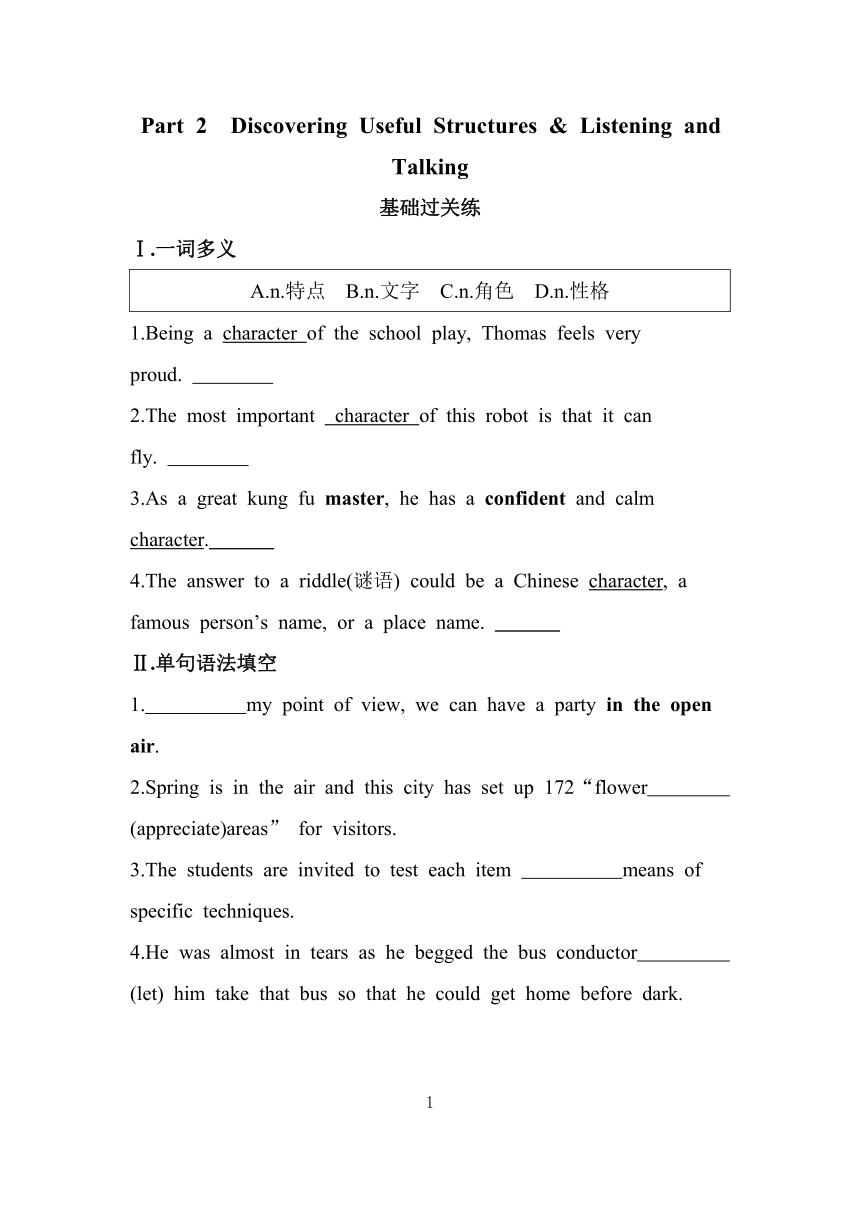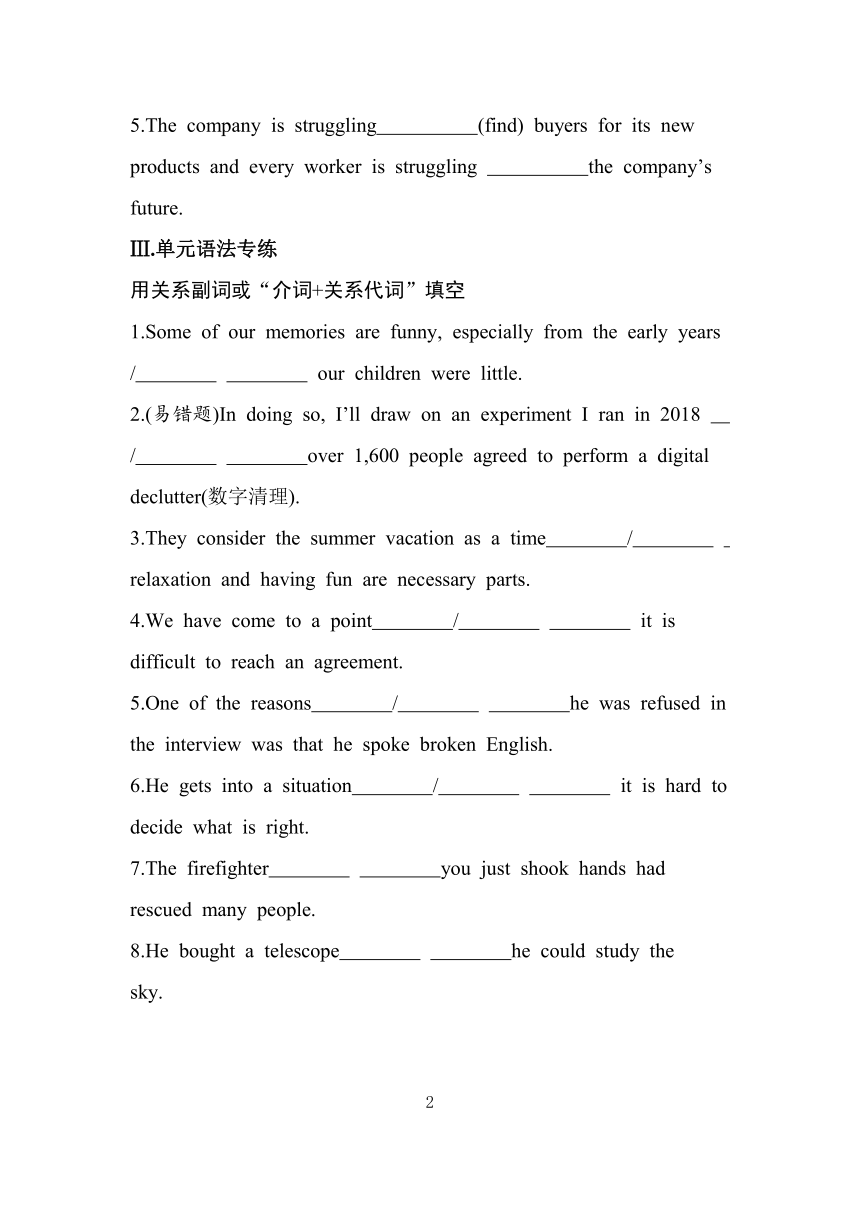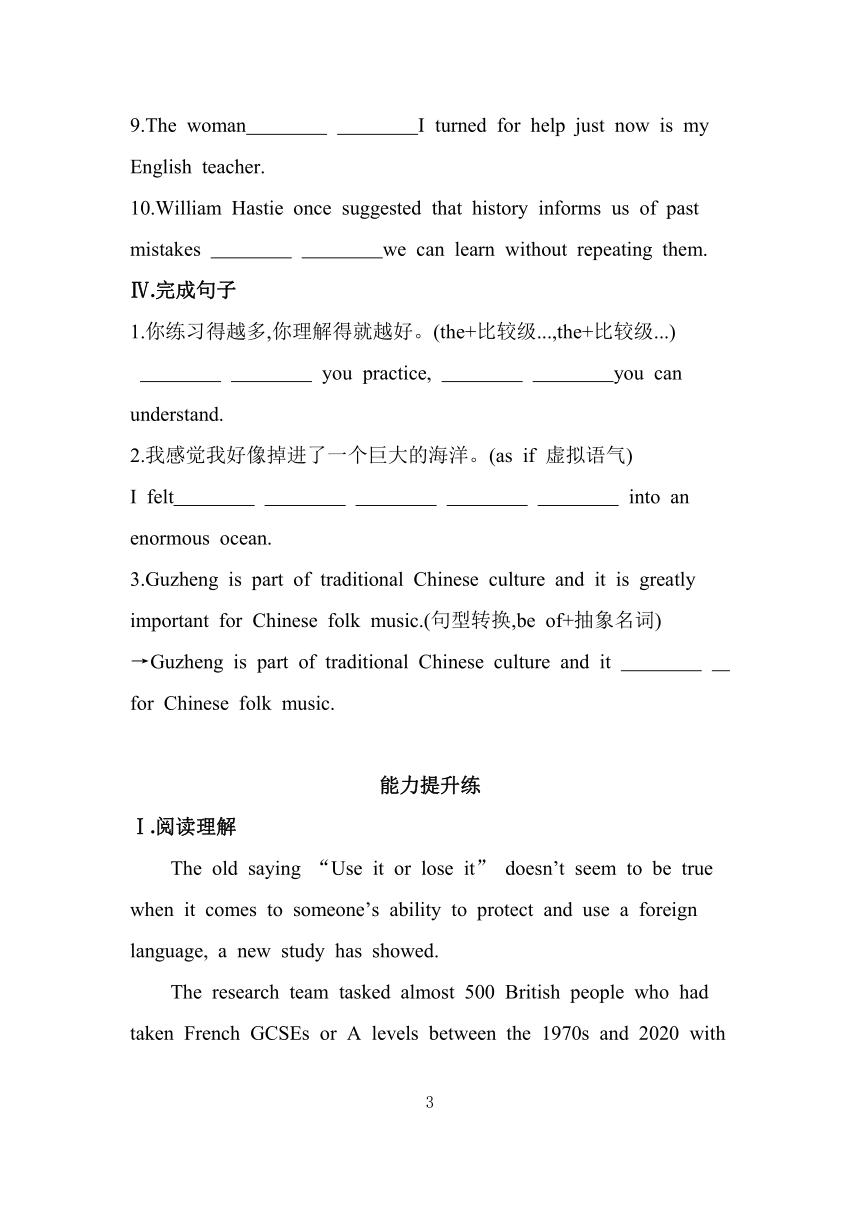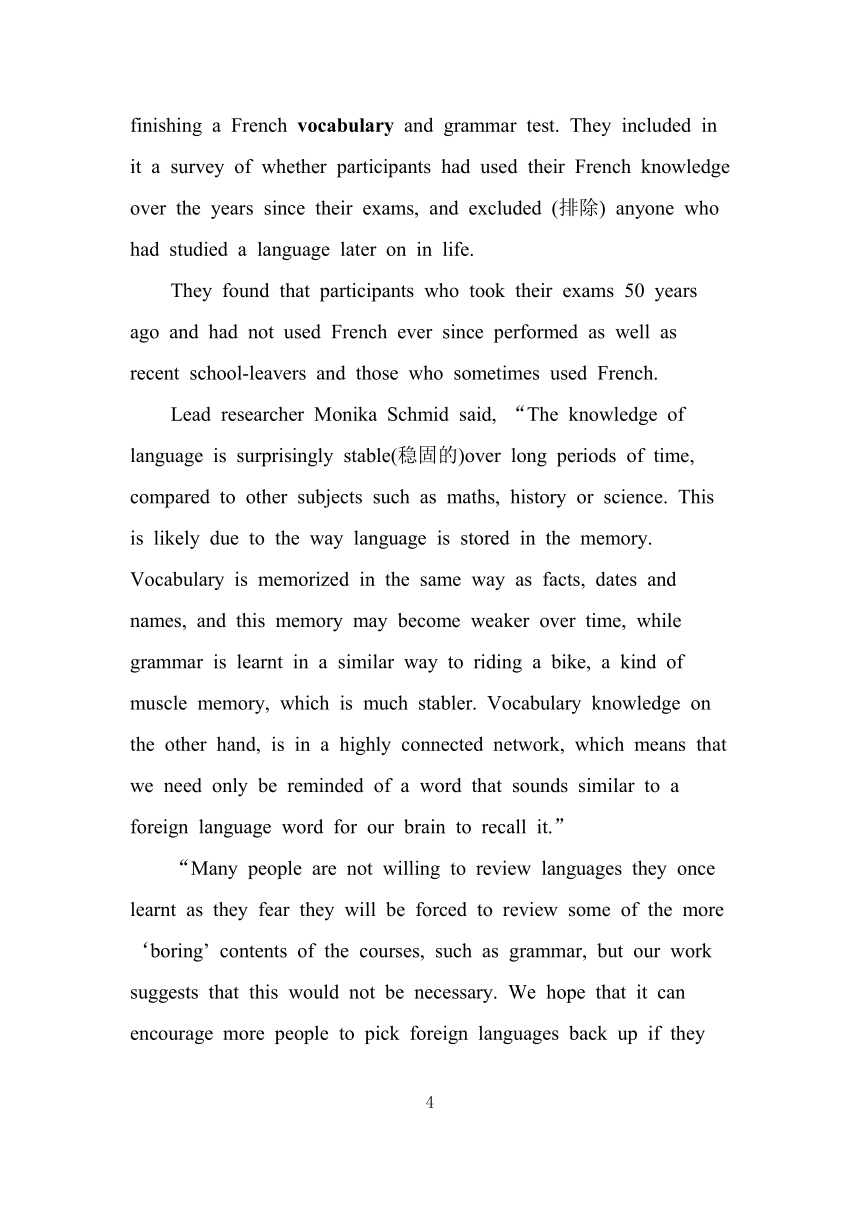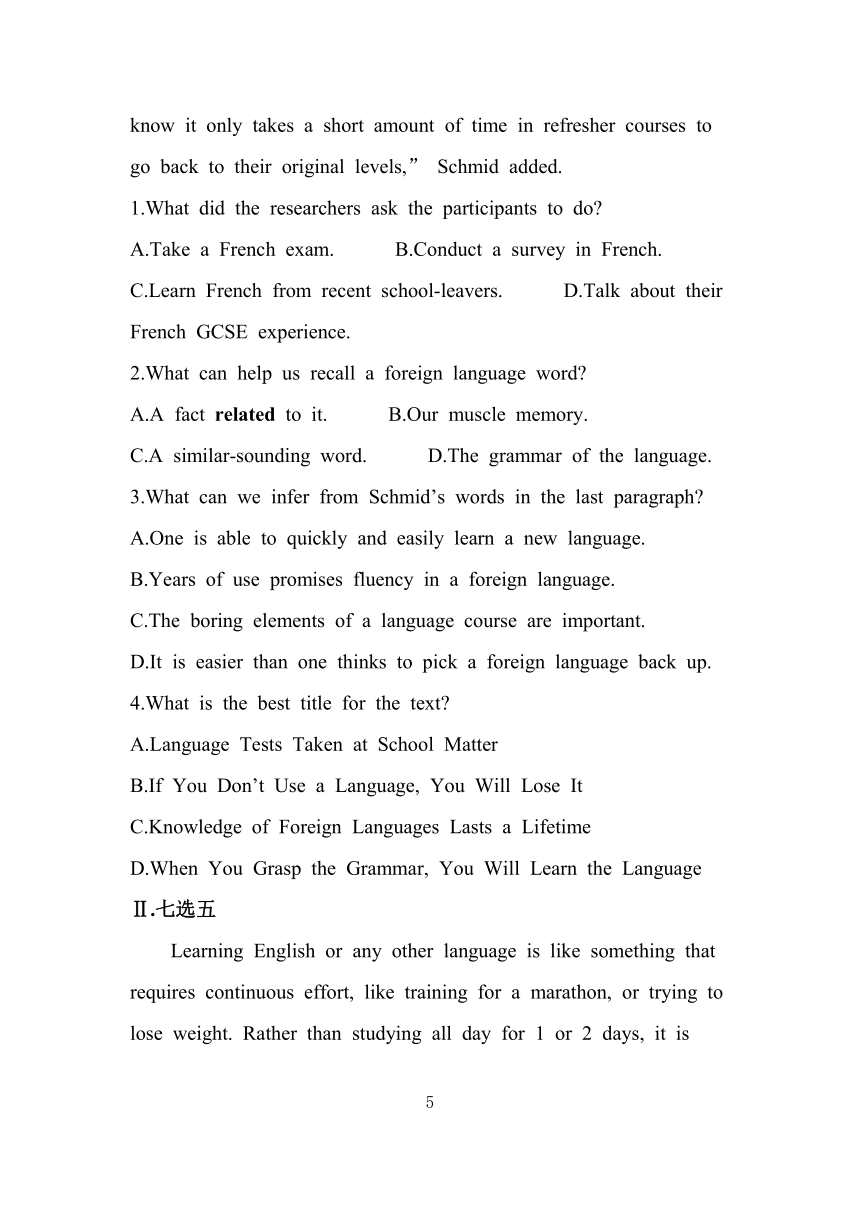 資源簡介
資源簡介
Part 2 Discovering Useful Structures & Listening and Talking
基礎過關練
Ⅰ.一詞多義
A.n.特點 B.n.文字 C.n.角色 D.n.性格
1.Being a character of the school play, Thomas feels very proud.
2.The most important character of this robot is that it can fly.
3.As a great kung fu master, he has a confident and calm character.
4.The answer to a riddle(謎語) could be a Chinese character, a famous person’s name, or a place name.
Ⅱ.單句語法填空
1. my point of view, we can have a party in the open air.
2.Spring is in the air and this city has set up 172“flower (appreciate)areas” for visitors.
3.The students are invited to test each item means of specific techniques.
4.He was almost in tears as he begged the bus conductor (let) him take that bus so that he could get home before dark.
5.The company is struggling (find) buyers for its new products and every worker is struggling the company’s future.
Ⅲ.單元語法專練
用關系副詞或“介詞+關系代詞”填空
1.Some of our memories are funny, especially from the early years / our children were little.
2.(易錯題)In doing so, I’ll draw on an experiment I ran in 2018 / over 1,600 people agreed to perform a digital declutter(數(shù)字清理).
3.They consider the summer vacation as a time / relaxation and having fun are necessary parts.
4.We have come to a point / it is difficult to reach an agreement.
5.One of the reasons / he was refused in the interview was that he spoke broken English.
6.He gets into a situation / it is hard to decide what is right.
7.The firefighter you just shook hands had rescued many people.
8.He bought a telescope he could study the sky.
9.The woman I turned for help just now is my English teacher.
10.William Hastie once suggested that history informs us of past mistakes we can learn without repeating them.
Ⅳ.完成句子
1.你練習得越多,你理解得就越好。(the+比較級...,the+比較級...)
you practice, you can understand.
2.我感覺我好像掉進了一個巨大的海洋。(as if 虛擬語氣)
I felt into an enormous ocean.
3.Guzheng is part of traditional Chinese culture and it is greatly important for Chinese folk music.(句型轉(zhuǎn)換,be of+抽象名詞)
→Guzheng is part of traditional Chinese culture and it for Chinese folk music.
能力提升練
Ⅰ.閱讀理解
The old saying “Use it or lose it” doesn’t seem to be true when it comes to someone’s ability to protect and use a foreign language, a new study has showed.
The research team tasked almost 500 British people who had taken French GCSEs or A levels between the 1970s and 2020 with finishing a French vocabulary and grammar test. They included in it a survey of whether participants had used their French knowledge over the years since their exams, and excluded (排除) anyone who had studied a language later on in life.
They found that participants who took their exams 50 years ago and had not used French ever since performed as well as recent school-leavers and those who sometimes used French.
Lead researcher Monika Schmid said, “The knowledge of language is surprisingly stable(穩(wěn)固的)over long periods of time, compared to other subjects such as maths, history or science. This is likely due to the way language is stored in the memory. Vocabulary is memorized in the same way as facts, dates and names, and this memory may become weaker over time, while grammar is learnt in a similar way to riding a bike, a kind of muscle memory, which is much stabler. Vocabulary knowledge on the other hand, is in a highly connected network, which means that we need only be reminded of a word that sounds similar to a foreign language word for our brain to recall it.”
“Many people are not willing to review languages they once learnt as they fear they will be forced to review some of the more ‘boring’ contents of the courses, such as grammar, but our work suggests that this would not be necessary. We hope that it can encourage more people to pick foreign languages back up if they know it only takes a short amount of time in refresher courses to go back to their original levels,” Schmid added.
1.What did the researchers ask the participants to do
A.Take a French exam. B.Conduct a survey in French.
C.Learn French from recent school-leavers. D.Talk about their French GCSE experience.
2.What can help us recall a foreign language word
A.A fact related to it. B.Our muscle memory.
C.A similar-sounding word. D.The grammar of the language.
3.What can we infer from Schmid’s words in the last paragraph
A.One is able to quickly and easily learn a new language.
B.Years of use promises fluency in a foreign language.
C.The boring elements of a language course are important.
D.It is easier than one thinks to pick a foreign language back up.
4.What is the best title for the text
A.Language Tests Taken at School Matter
B.If You Don’t Use a Language, You Will Lose It
C.Knowledge of Foreign Languages Lasts a Lifetime
D.When You Grasp the Grammar, You Will Learn the Language
Ⅱ.七選五
Learning English or any other language is like something that requires continuous effort, like training for a marathon, or trying to lose weight. Rather than studying all day for 1 or 2 days, it is much better to do a small amount of study or practice every day, or at least on a regular basis. 1
It is important when learning English or any other language not to be afraid of making mistakes. The important thing is to be able to understand and communicate ideas. Even native speakers don’t speak with perfect grammar. 2 If you speak English with close friends or family, ask them to do that.
Put yourself in an environment where you are surrounded by English. Watching TV programs in English and listening to English music can be good examples.
Tell your friends and family about your goal or desire to learn English. 3 It could also help to explain why you want to improve your English, such as to study abroad or to get a new job.
English has four main skills: listening, speaking, reading and writing. 4 However, if you have trouble with any one of them, spend time on it. Generally, skills required to produce language like speaking and writing will develop slower than listening and reading.
5 Avoid trying to memorize long lists of vocabulary, unless you feel that this is the best way to learn.
Try to learn words in a context. It will not only help you to remember the words, but also help you to use them correctly when you are writing or speaking.
A.It will be helpful to cover each skill.
B.Use mind maps to help remember vocabulary.
C.Here are some ways to improve your listening skills.
D.Writing is a big headache for many English beginners.
E.Here is a list of some practical ways to improve your English.
F.Find friends with similar interests who support your goal.
G.If you do want to improve, ask your teacher to correct any mistake you make.
1. 2. 3. 4. 5.
Ⅲ.完形填空
One year ago, I paid no attention to English idioms (習語), though my teacher told me about them again and again. But soon, the 1 of English idioms was shown in an amusing experience.
One day, I 2 to meet an Englishman on the road, and soon we began to talk. As I was talking about how I was studying English, the 3 seemed to be surprised. Gently shaking his 4 and shrugging his shoulders, he said, “You don’t say!” I was 5 . I thought perhaps this was not a proper 6 . I had better change it. So I said to him, “Have you ever been to the Great Wall ” “Certainly! It was amazing. Everyone back home would 7 me if I left China without seeing it.” I continued, “The Great Wall is one of the 8 in the world. We are very proud of it.” But soon, “You don’t say!” came to my ears again. I couldn’t 9 asking, “Why did you ask me not to talk about it ” “Well, I didn’t ask you to do so,” he answered, 10 surprised. I said, “Didn’t you say ‘You don’t say!’ ” 11 this, the Englishman laughed to tears. He began to 12 , “‘You don’t say!’ actually means ‘Really!’ It is a(n) 13 of surprise. Perhaps you don’t pay attention to English idioms.” Only then did I know I had made a 14 of myself. Since then I have been more 15 with idiomatic expressions.
1.A.effect B.difference
C.importance D.attitude
2.A.used B.expected
C.happened D.refused
3.A.foreigner B.teacher
C.student D.native
4.A.hand B.arm
C.head D.body
5.A.worried B.uneasy
C.curious D.confused
6.A.style B.topic
C.opinion D.means
7.A.laugh at B.run after
C.rely on D.refer to
8.A.works B.wonders
C.choices D.examples
9.A.help B.admit
C.regret D.allow
10.A.naturally B.purposely
C.hardly D.greatly
11.A.Finding B.Feeling
C.Hearing D.Noticing
12.A.request B.explain
C.complain D.determine
13.A.problem B.expression
C.goal D.recognition
14.A.sense B.symbol
C.mess D.fool
15.A.satisfied B.annoyed
C.anxious D.careful
答案與分層梯度式解析
UNIT 5 LANGUAGES AROUND THE WORLD
Part 2 Discovering Useful Structures &
Listening and Talking
基礎過關練
Ⅰ.1.C 句意:作為這部學校戲劇中的一個角色,托馬斯感到非常自豪。
2.A 句意:這個機器人最重要的特點是它能夠飛行。
3.D 句意:作為一個偉大的功夫大師,他有著自信和沉著的性格。
4.B 句意:謎語的答案可能是一個漢字、一個名人的名字或者一個地名。
Ⅱ.1.From 考查介詞。句意:在我看來,我們可以在戶外舉行聚會。from my point of view意為“在我看來”,單詞位于句首,首字母要大寫。故填From。
2.appreciation 考查名詞。句意:春意盎然,這座城市為游客設置了172個“賞花區(qū)”。此處應用名詞作定語。故填appreciation。flower appreciation areas意為“賞花區(qū)”。
3.by 考查介詞。by means of意為“依靠……方法;借助……手段”。句意:學生們被邀請采用特定的技術去測試每件物品。
4.to let 考查動詞不定式。句意:當他懇求公共汽車售票員讓他乘坐那輛公共汽車,以便他能在天黑前回到家時,他幾乎要哭了。beg sb. to do sth.意為“懇求某人做某事”。故填to let。
5.to find;for 考查struggle的用法。句意:該公司正在努力為其新產(chǎn)品尋找買家,每個工人都在為公司的未來而奮斗。struggle to do sth.意為“努力做某事”;struggle for...意為“為……而奮斗”。故第一空填to find,第二空填for。
Ⅲ.1.when;in which 將先行詞代入從句后為“our children were little in the early years”。
2.where/in which 將先行詞代入從句后為“over 1,600 people agreed to perform a digital declutter in the experiment”。
易錯歸因
本題易受前面2018的影響誤填when。2018并不是定語從句的先行詞,I ran in 2018為定語從句,修飾experiment。experiment才是設空處引導的定語從句的先行詞。
3.when;in/during which 將先行詞代入從句后為“relaxation and having fun are necessary parts in/during the time”。
4.where/when;at which 將先行詞代入從句后為“it is difficult to reach an agreement at the point”。point在這里可表時間,意為“時刻,時候”;也可表抽象的地點,意為“階段,地步”。
5.why;for which 將先行詞代入從句后為“he was refused in the interview for the reasons”。
6.where;in which 將先行詞代入從句后為“it is hard to decide what is right in the situation”。
7.with whom 將先行詞代入從句后為“you just shook hands with the firefighter”。
8.through which 將先行詞代入從句后為“he could study the sky through the telescope”。
9.to whom 將先行詞代入從句后為“I turned to the woman for help just now”。
10.from which 將先行詞代入從句后為“we can learn from past mistakes without repeating them”。
Ⅳ.1.The more;the better 2.as if I had dropped 3.is of great importance
能力提升練
Ⅰ.◎語篇解讀 本文是一篇說明文。研究發(fā)現(xiàn)在保存和使用外語的能力方面,“非用即失”的說法似乎并不正確。
1.A 細節(jié)理解題。根據(jù)第二段中的“The research team tasked almost 500 British people...with finishing a French vocabulary and grammar test.”可知,研究團隊要求參與者完成法語詞匯和語法測試。故選A。task sb. with...意為“交給某人任務,派給某人工作”。
2.C 細節(jié)理解題。根據(jù)第四段中的“we need only be reminded of a word that sounds similar to a foreign language word for our brain to recall it”可知,我們只需要被提醒一個聽起來與某個外語單詞相似的單詞,我們的大腦就能回憶起它。故選C。
3.D 推理判斷題。根據(jù)尾段的“it only takes a short amount of time in refresher courses to go back to their original levels” 可知,Schmid認為,只需要很短的復習時間人們的外語就能回到原來的水平,所以重新拾起一門外語比人們想的簡單,故選D。
4.C 主旨大意題。
根據(jù)文章結構可知,C項“外語知識受用一生”能夠概括本文的主題。故選C。
【高頻詞匯】 1.when it comes to... 當提到……時 2.participant n.參與者 3.perform v.表現(xiàn) 4.compared to...與……相比 5.remind v.提醒,使想起 6.recall v.回憶起;回想起 7.pick up 學會 8.original adj.最初的;原來的
【熟詞生義】 task v.給……委派任務
長難句
原句 Many people are not willing to review languages they once learnt as they fear they will be forced to review some of the more “boring” contents of the courses, such as grammar, but our work suggests that this would not be necessary.
分析 該句是一個并列復合句。but連接兩個并列分句,前后兩部分為轉(zhuǎn)折關系;在第一個分句中,they once learnt 為省略了that/which的定語從句,as引導原因狀語從句,fear后為省略that的賓語從句;在第二個分句中,that引導suggests后的賓語從句。
譯文 許多人不愿意復習他們曾經(jīng)學過的語言,因為他們擔心他們會被迫復習一些更“無聊”的課程內(nèi)容,比如語法,但我們的工作表明,這是沒有必要的。
Ⅱ.◎語篇解讀 本文是一篇說明文。文章介紹了一些切實可行的學習英語的方法。
1.E 過渡句。設空處上文簡要說明了學習英語或任何其他語言應該怎么做,下文闡述了一些具體的學英語的方法。E項(這里列出了一些提高你的英語水平的實用的方法)承上啟下。故選E。
易錯歸因
本題考生容易因看到C項中的“Here are some ways”而錯選,但是C項中的“your listening skills”范圍過小,與下文的內(nèi)容不匹配,因此可排除。
2.G 細節(jié)句。設空處上一句提到“即使母語使用者也不會用完美的語法進行交談”,設空處下一句提到“如果你用英語和親密的朋友或家人交談,請他們那樣做”。G項(如果你確實想提升,請你的老師糾正你犯的任何一個錯誤)與上文所述話題一致,都與錯誤有關,且與下文銜接緊密,設空處下一句中的“that”指的就是G項中提到的“correct any mistake you make”。
3.F 細節(jié)句。設空處上一句提到“告訴你的朋友和家人你的目標或?qū)W習英語的愿望”。F項(找到有相似興趣的支持你的目標的朋友)中的friends和goal照應上文,符合語境。故選F項。
4.A 細節(jié)句。設空處上一句提到“英語包含四項主要技能:聽、說、讀、寫”,設空處下一句提到“然而,如果你對其中任何一項有問題,就在那上面花時間”。A項 (擁有各項技能會很有幫助)與上文所述話題一致、銜接緊密,且下文與其形成轉(zhuǎn)折關系。故選A。
5.B 細節(jié)句。設空處下一句提到“除非你覺得這是最好的學習方式,否則不要試圖記住長長的詞匯表”,即記長串的詞匯是作者不太建議的學習詞匯的方法,B項(使用思維導圖幫助記憶詞匯)是作者建議的方法,符合語境。故選B。
【高頻詞匯】 1.on a regular basis定期地
2.communicate v.傳達;傳遞;溝通 3.surround v.圍繞 4.improve v.提升,提高 5.practical adj.實用的;切實可行的
Ⅲ.◎語篇解讀 本文是一篇記敘文。文章講述的是作者由于沒有注意到習語的重要性,在一次與外國友人的交流中出了洋相。由此作者意識到在學習英語的過程中,應該注重習語的表達。
1.C 根據(jù)上文“One year ago, I paid no attention to English idioms”和“But soon”可知,上下文之間是轉(zhuǎn)折關系,說明作者之前不重視英語習語,但后來認識到了它的重要性。A.作用;B.區(qū)別;C.重要性;D.態(tài)度。故選C。
2.C 根據(jù)句中的“on the road”可推知,作者碰巧遇到一個英國人。A.使用;B.期待;C.碰巧;D.拒絕。故選C。
3.A 根據(jù)下文的“The Great Wall is...We are very proud of it.”可知,作者是中國人。結合前面的Englishman可知,作者是與外國人交談。A.外國人;B.教師;C.學生;D.本地人。故選A。
4.C 根據(jù)上文的“be surprised”和下文的“shrugging his shoulders”可知,這個外國人感到驚訝,所以搖頭聳肩。A.手;B.胳膊;C.頭;D.身體。故選C。
5.D 根據(jù)下文“But soon, ‘You don’t say!’ came to my ears again. I couldn’t 9 asking, ‘Why did you ask me not to talk about it ’”可知,作者不理解“You don’t say!”的意思,感覺很困惑。A.擔心的;B.不安的;C.好奇的;D.困惑的。故選D。
6.B 根據(jù)下文“I had better change it.”可知,作者認為自己選擇的談話話題不合適,所以決定換一個話題。A.風格;B.話題;C.觀點;D.方式。故選B。
7.A 結合常識和后文“if I left China without seeing it”可知,如果外國人來中國沒去長城,則會被家里人笑話。A.嘲笑;B.追逐;C.依靠;D.提及。故選A。
8.B 結合常識和下一句“We are very proud of it.”可知,這里指長城是世界上的奇跡之一。故選B。 A.作品;B.奇跡;C.選擇;D.例子。
9.A 根據(jù)上文“But soon ‘You don’t say!’ came to my ears again.”和下文“Why did you ask me not to talk about it ”可知,作者對于外國人一直說“You don’t say!”不理解,故忍不住問他原因。can’t help doing sth.意為“忍不住做某事”。故選A。
10.D 根據(jù)“Well, I didn’t ask you to do so”和“‘You don’t say!’ actually means ‘Really!’”可知,外國人并不是不讓作者談論這個話題,所以這里指外國人非常驚訝。A.自然地;B.故意地;C.幾乎不;D.非常。故選D。
11.C 根據(jù)上文“Didn’t you say ‘You don’t say!’ ” 和下文“the Englishman laughed to tears”可知,英國人聽了作者的話之后笑哭了。A.找到;B.感覺;C.聽到;D.注意到。故選C。
12.B 根據(jù)句中的“‘You don’t say!’ actually means ‘Really!’ It is a(n) 13 of surprise.”可知,英國人給作者解釋了什么是“You don’t say!”。A.要求;B.解釋;C.抱怨;D.決定。故選B。
13.B 根據(jù)前文“‘You don’t say!’ actually means ‘Really!’”可知,這是表示驚訝的措辭。A.問題;B.表達,措辭;C.目標;D.承認。故選B。
14.D 根據(jù)上文內(nèi)容可知,作者不知道“You don’t say!”這個英語習語的真正含義,出了洋相。make a fool of oneself意為“出洋相;出丑”。故選D。
15.D 根據(jù)上文“Only then did I know I had made a fool of myself.”可知,作者在知道自己出了洋相后,對英語習語的使用更加小心了。A.感到滿意的;B.惱怒的;C.焦慮的;D.小心的。故選D。
【高頻詞匯】 1.pay attention to 關注…… 2.amusing adj.好笑的 3.gently adv.文靜地;溫柔地 4.amazing adj.令人驚奇的
【差距詞匯】 shrug v.聳(肩)
長難句
原句 Only then did I know I had made a fool of myself.
分析 該句是一個主從復合句。主句中“Only+狀語”位于句首,后面使用了部分倒裝(即把謂語的一部分放到主語前);know后面是省略了that的賓語從句。
譯文 直到那時我才知道我出洋相了。
17
展開更多......
收起↑
 資源預覽
資源預覽
